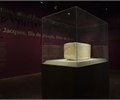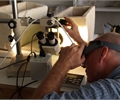The Solomon Treasures
The discovery in Jerusalem in 2007 of a tomb said to belong to the family of Jesus of Nazareth is just the latest in a long line of extraordinary finds that have recently come to light in the Holy Land. But not all these finds are quite what they seem. Both a stone tablet said to come from the Temple of Solomon, and an ossuary apparently belonging to the brother of Jesus, have been declared fakes.
While some of the experts who originally authenticated these objects still maintain they are genuine, the Israeli authorities are convinced they are dealing with sophisticated fakes, and have extended the investigation to a huge number of antiquities in museums and private collections. Any object which has appeared on the antiquities market and has no clear links to an archaeological site is suspect. Astonishingly, the vast majority of those examined have now been declared fake. It appears that forgers have been producing high-quality, fake Biblical artefacts, good enough to deceive experts, for many years.
In time the investigators’ attention turned to one of the most revered objects in Israel: a tiny relic known as the ivory pomegranate. This turned up twenty years ago and has been in the Israel Museum ever since. Like the stone tablet, it too was linked to the Temple of Solomon, and amazingly when investigators re-examined it, they concluded that though the pomegranate itself was genuine, the inscription that linked it to the bible had been added in modern times. It was a shattering development.
As forensic scientists now turn their attention to the ossuaries from the ‘Jesus family tomb’, Israeli archaeologists are left fearing that history and science is being repeatedly distorted. In a country where three powerful religions stake their claim to be the heirs of history, where believers may be anxious to accept any evidence which appears, archaeologists now have a tough job separating fiction from fact.
Shot in HD. Distributor: DCD Rights/TV6









